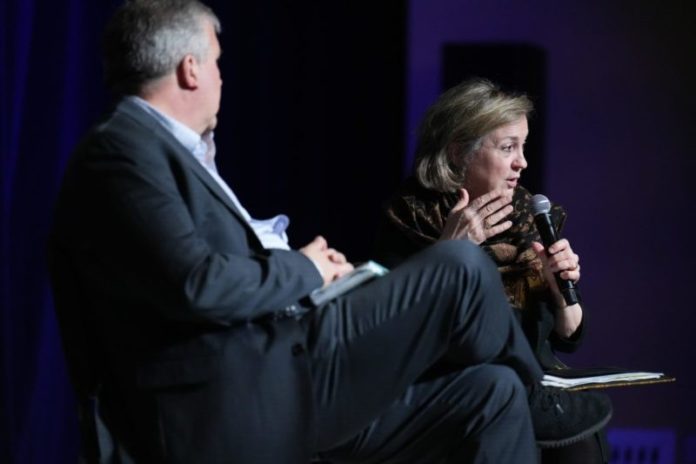When Dr. Alex Hartemink took the stage at Belmont recently for a conversation with Dr. Greg Jones, students might have expected him to talk about his work at Duke University with algorithms and computational genomics. And yes, he did do some of that. But mostly he talked about truth and beauty. He talked about growing up and finding his way. He talked about losing faith and finding it. He talked about purpose.
Hartemink was one of eight guest speakers in a course hosted by Dr. Greg Jones and Rev. Susan Pendelton Jones. Other speakers included the likes of Makoto Fujimura (artist and author of “Art+Faith: A Theology of Making”), Esau McCaulley (author of “Reading While Black: African American Biblical Interpretation as an Exercise in Hope” and Cordia Harrington (CEO, entrepreneur and founder of The Bakery Companies). 
During the “What’s Your Why” course (also known as “Developing Purpose”) over the past semester, students have met as a group in the Massey Performing Arts Center, but it often feels like something that could happen in a living room. The Joneses often kick-off sessions with a chat with their guests, and then students have the opportunity to ponder related life questions, to talk amongst themselves. It’s a time to slow down, reflect, listen and learn from one another – all in the context of unearthing a purposeful life that begins in finding the “why.”
Students begin the course by choosing a section – sincere storyteller, organizational innovator, thoughtful investigator, creative visionary or compassionate guide. They meet as the full group but also with their smaller sections where students from various majors and grade levels bring their unique sets of experiences, goals and dreams while also finding commonalities and community amid their differences.
For example, if Hartemink were taking the class, he might choose the thoughtful investigator category. He recalled an early time when his father bought a TI-99 computer on sale for $50. He majored in physics, economics and math, which he calls “the language of the truth of something.” Then as the conversation continued to what he calls “adaptive algorithm” – making the best choices you can at any point in time with faith – it helped illuminate the multitudes we contain. As we learn from one another’s experiences and interests, we also allow space for the serendipity that happens when ideas collide to form something wholly new.
“I appreciated his take in that truth, goodness and beauty can still motivate those in the scientific fields and that we can remain creative visionaries and storytellers even with critical thinking and investigative skills,” said Analese Mitchell, a freshman public health major. “I’ve been able to take religion, theology, arts, humanities hand in hand with love for science and math and deep critical thinking and know they aren’t completely removed from each other but rather interplay really well. As a whole sense, all these things can motivate me vocationally in my life and continue to give me a sense of purpose.”
Indeed, students who have been taking the course during the Spring 2022 semester have acknowledged the joy they find in learning about their differences and unlikely similarities.
“Listening to people’s thoughts and ideas and how we really are related was super-cool for me,” said Erin Patterson, a senior marketing major who chose the thoughtful investigator group. “Never can you be separate doing just one thing. It’s all super inter-connected, and I thought that was really interesting.”
Other students appreciated the balance the course provided in stimulating the mind and stimulating community.
For Wesley Gerndt, a sophomore psychology major in the compassionate guide section, the class has “definitely challenged me to consider new perspectives and value people from all walks of life.”
Please join our FREE Newsletter



















